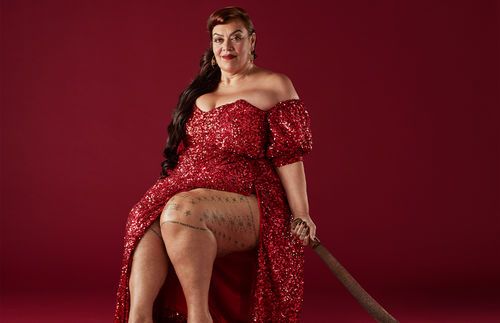

Poet Selina Tusitala Marsh, left, arts laureate Tusiata Avia , centre, and former chair of Creative New Zealand Caren Rangi.
Photo/ Facebook
Pacific arts scene ‘stronger than ever’, while future funding in question
Pacific talent is abundant in the arts sector, but will future projects be backed by the government?

It’s a freezing Friday morning, and Selina Tusitala Marsh is excited to be wearing her Wonder Woman t-shirt.
The occasion is ComicFest, where Marsh will be delivering the keynote address and judging a cosplay competition.
“I actually am shocked to be invited," says Marsh, an award-winning poet and scholar with Samoan and Tuvaluan heritage.
“I'm used to being the brown girl from West Auckland, peering in the window, and I've still got to catch up with myself that they want me to speak alongside New Zealand comic greats such as Dylan Horrocks and Sarah Lang.”
Marsh is also the author and illustrator behind the graphic novel series Mophead. Speaking with ‘Alakihihfo Vailala on Pacific Mornings, Marsh doesn’t want to forecast gloom on the future of Pacific arts, preferring “to focus on the flourishing art scene out there”.
“If we focus on the risk, all we're going to get back is fear. We're going to get back tight balls of creativity if we focus on the risk.”
This comes after broad cost-cutting measures by the coalition government, including thousands of job cuts at government ministries and a proposed 40 per cent drop in staff at the Ministry for Pacific Peoples.
“Our painters are painting phenomenally, our theatre practitioners are doing it," says Marsh.
“Look at our arts laureate, Tusiata Avia, the most “hated poet in New Zealand”, but only by a very small fraction, everybody else is backing her.
“Everyone has the right to tell their story the way that they choose to, and she stirs up the pot for all of us and she's flourishing in the public eye, so I reckon we're stronger than ever.”

Funding for Tusiata Avia's poems was slammed by ACT's arts spokesperson, Todd Stephenson.
Former chair of Creative New Zealand Caren Rangi also lauds the work of Avia, but admits some policy decisions weren’t always popular.
“We were criticised for funding hate speech.”
Rangi has worked with the creative development agency for 12 years, spending three years as chair, and says after some challenges, the tide is starting to turn towards public acceptance of how funding is distributed.
“One of the experiences during my time was quite a huge backlash when some organisations who'd been quite used to receiving funding no longer did, and we were starting to give funding to new organisations, some organisations had a very allergic reaction to that, went very public about how they felt they deserved 'their money'.
“I got accused of reverse racism, because there seemed to be a lot of funding going to more Māori and Pacific organisations.
“Pacific arts isn’t just ‘a nice thing to do’, it’s actually strategically important for the future of arts in New Zealand. If you take a demographic view on this, if you think of the increase in our population, more New Zealanders are going to look like us, so it’s really important that the arts of our people are recognised out there.”
Whilst Rangi agrees we are “spoiled for choice” and have much to celebrate from our local artists, she admits there could be an economic challenge ahead for the sector.
“We're a little bit unclear at the moment what this government's intentions might be around arts funding.
“Minister Goldsmith has indicated that he's keen to look at an overall arts strategy to ensure the sustainability of the arts, so that would be really good to see, but we know there's lots of pull on government funding and lotteries funding as well, which is where most of the arts funding comes from.”
Marsh, however, is confident Pacific artists will continue to create, regardless of whether funding is forthcoming.
“If you've got a story in you, if you've got a picture in you, is what's happening out there going to stop you bringing out from inside something to share with the world? No, no, no.
“So no matter what is happening out there, our stories continue to be told, our art continues to be shared, and most importantly for the person sitting there going, ‘I might as well just go sit behind my desk in the office and the arts are doomed, and I'm just going to keep into my little world’, pick up a pen and start drawing.
“You never know what might happen.”
Watch the full interview with former Creative NZ chair Caren Rangi on Pacific Mornings:




